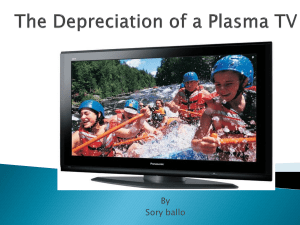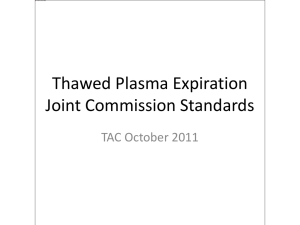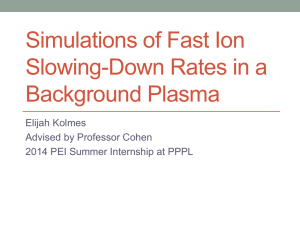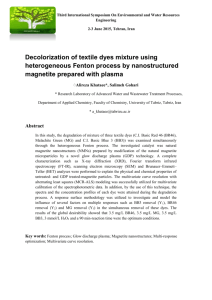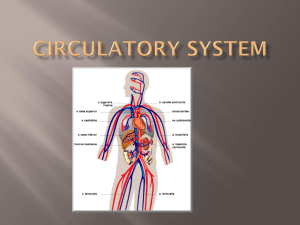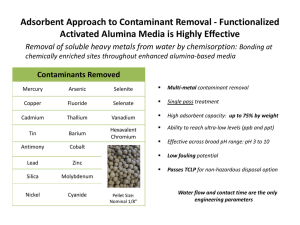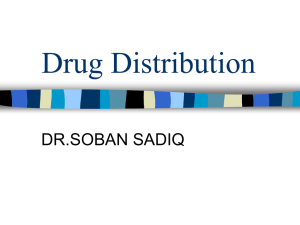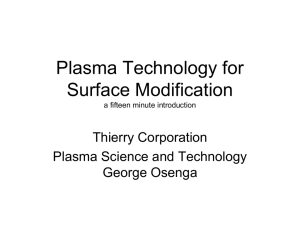Introduction of PlasTEP
advertisement
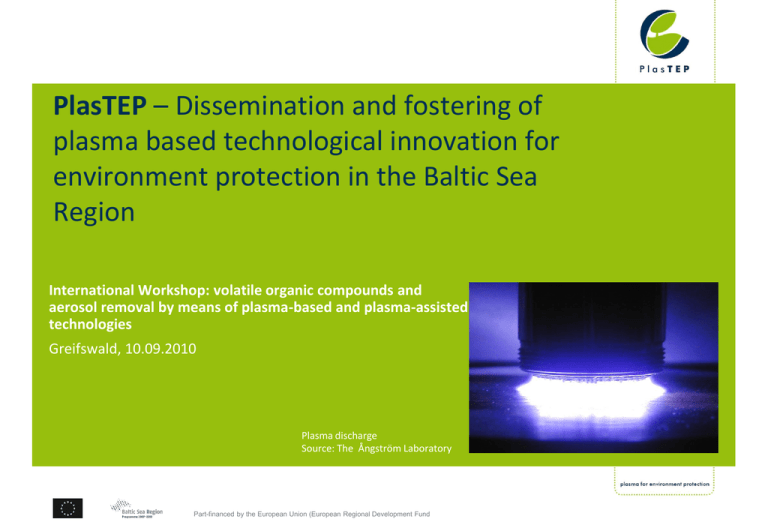
PlasTEP – Dissemination and fostering of plasma based technological innovation for environment protection in the Baltic Sea Region International Workshop: volatile organic compounds and aerosol removal by means of plasma-based and plasma-assisted technologies Greifswald, 10.09.2010 Plasma discharge Source: The Ångström Laboratory Part-financed by the European Union (European Regional Development Fund Content 1. General Objectives 2. Structure of PlasTEP: ● Work packages 3 - 6 3. Project Partners 4. Financial Management Source: Leibniz Institute of Plasma Science and Technology International Workshop on VOC removal 1 1. General Objectives PlasTEP has the following aims: • Dissemination and fostering of plasma based technological innovation for environment protection in the Baltic Sea Region (BSR) • Build up a network with partners from industry, science and policy focused on plasma technology for environment • Offer new possibilities for environment neutral production • Combining the existing knowledge about plasma technologies in the BSR • Contribute to a better future by cleaning for example exhaust gases or waste water • Bring the idea of investing in plasma technology and therewith in future research into the minds of industrial decision makers and politicians and show people: there are new ways! International Workshop on VOC removal 2 2. Structure of PlasTEP WP 0: Preparation Activities WP 1: Project Management & Administration WP 2: Communication & Information WP 3: Plasma based technologies sustainability analysis and integration in to the educational process WP 4: Plasma based cleaning of exhaust gases of combustion WP 5: Removal of organic/hazardous compounds and aerosols WP 6: Plasma technologies for water cleaning Source: Risø (Plasmaball) International Workshop on VOC removal 3 Work package 3 Plasma based technologies sustainability analysis and integration in to the education process • analyses of plasma-based environmental protection solutions in respect to environmental performance and research/marketing integration potential • origination of basis for support of applications/investments for plasma technolo-gies for pollutant removal • cost /risk analyses of different plasma applications in the BSR as a chance of a sustainable environment friendly production PlasTEP force: • The discussion about methodologies for implementation • Integration of plasma knowledge in the educational process Communication Seminar International Workshop on VOC removal 4 Work package 4 Plasma based cleaning of exhaust gases of combustion • Spreading information about plasma technologies reducing nitrogen oxide (NOx) and sulphur oxide (SOx) which emerge in mostly all combustion processes • removals are from commercialisation-ready electron beam flue gas treatment over ozonisation up to direct plasma treatment with or without catalytic reactions in laboratory scale. • attract interest of potential industrial users by developing an application guide • exchange of knowledge including a comparison of the various plasma technologies and definition of their different fields of application and (mobile) feasibility installation Electron beam installation in a power plant International Workshop on VOC removal 5 Work package 5 Removal of organic/hazardous compounds and aerosols from gases • knowledge transfer for process for VOC (volatile organic compounds) removal by use of plasma technologies • comparison of various plasma technologies for VOC removal and finding additional fields of application (odour destruction) • attract potential end users by practical demonstration geared with different application (type of exhaust, mass flow, available space) • support of new innovative plasma-combined catalytic methods to become visible in industry International Workshop on VOC removal 6 Work package 6 Plasma technologies for water treatment • joint enhancement of the new innovative method of electrical discharge plasma • pre-feasibility study of this method for cleaning of water from organic compound • realisation of a mobile prototype for destruction of oil and oil-type © TU Szczecin and photo catalyst treatment of waste water (e.g. port water) leakages for acquisition of further funds and investments Plasma treatment of water International Workshop on VOC removal 7 01 Technology Centre of Western Pomerania (TZV) Germany 02 Leibniz Institute for Plasma Science and Technology (INP) Germany 03 VDI Mecklenburg Western Pomerania (VDI) Germany 04 Risø National Laboratory for Sustainable Energy, TU of Denmark (Risø) Denmark 05 Uppsala University, The Ångström Laboratory (UUA) Sweden 06 Lappeenranta University of Technology, ASTRal (LUT) Finland 07 Riga Technical University (RTU) Latvia 08 Lithuanian Energy Institute (LEI) Lithuania 09 Kaunas University of Technology (KUT) Lithuania 10 Vilnius Gediminas Technical University (VGTU) Lithuania 11 Institute of Nuclear Chemistry and Technology (INCT) Poland 12 The Szewalski Institute of Fluid Flow Machinery (IMP) Poland 13 West Pomeranian University of Technology (SUT) Poland 14 University of Tartu (UT) Estonia 15 Association of Polish Electrical Engineers, Szczecin Branch (SEP) Poland International Workshop on VOC removal © TU Szczecin 3. Project Partners 8 International Workshop on VOC removal 9 4. Financial Management (Basic Data) • Overall budget: 3.820.000 € • Duration: 01.01.2010 – 31.12.2012 • Leadpartner: TZV International Workshop on VOC removal 10 Thank you for your attention Contact data: Project PlasTEP at Western Pomeranian Technology Centre Brandteichstr. 20 17489 Greifswald Germany Phone: +49 3834 550102 Fax: +49 3834 550111 schwock@technologiezentrum.de Part-financed by the European Union (European Regional Development Fund
